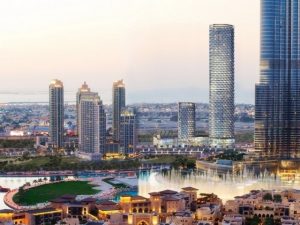The United Arab Emirates (UAE) has rapidly transformed from a desert landscape into a global economic powerhouse. The country’s meteoric rise in business and innovation is no accident. The UAE government, with its forward-thinking vision and strategic initiatives, has crafted an environment that is uniquely favorable for businesses to thrive. Whether you’re an entrepreneur looking to start a new venture or a multinational corporation seeking expansion, the UAE offers a wealth of opportunities. But how exactly does the UAE encourage businesses to grow? In this article, we will explore the policies, incentives, and strategies that make the UAE a top destination for business development.
1. Strategic Location and Access to Global Markets
The UAE’s geographic location is one of the most strategic in the world. Positioned at the crossroads of Europe, Asia, and Africa, the UAE offers businesses unparalleled access to key international markets. Dubai, the commercial hub, and Abu Dhabi, the capital, serve as gateways for companies seeking to expand their reach in the Middle East, North Africa, and the broader Asia-Pacific region.
Furthermore, the UAE’s modern infrastructure—airports, seaports, highways, and logistics facilities—ensures that goods and services can move quickly and efficiently across borders. This connectivity is a critical factor for businesses, particularly those engaged in import-export or international trade.
2. Tax Benefits and Business-Friendly Policies
Perhaps one of the most attractive features of the UAE for entrepreneurs and businesses is the tax regime. The country has long been known for its tax-free environment. However, it’s worth noting that the introduction of VAT in 2018 and certain corporate taxes have been implemented. Despite this, the UAE’s overall tax burden remains extremely competitive compared to other global business hubs.
- Zero Personal Income Tax: One of the standout benefits for entrepreneurs and employees in the UAE is the absence of personal income tax. This policy allows businesses to retain more of their earnings and rewards employees with higher take-home pay.
- No Corporate Tax in Free Zones: The UAE offers various free zones, each designed to encourage specific industries like technology, media, or logistics. Within these zones, businesses can operate without paying corporate tax for up to 50 years in some cases.
- VAT at 5%: The introduction of VAT at 5% remains one of the lowest globally, making it relatively easy for businesses to manage their tax obligations.
The combination of low taxes, minimal bureaucracy, and transparent business regulations makes the UAE an ideal destination for companies looking to minimize costs and maximize profitability.
3. Free Zones – The Engine of Business Growth
The UAE has established over 40 free zones across the country, each offering unique incentives to businesses in specific sectors. These zones allow companies to set up operations without the need for a local partner or sponsor, providing 100% foreign ownership, tax exemptions, and other perks.
- Dubai Internet City (DIC): A thriving tech hub, DIC is home to numerous IT and telecommunications firms, offering world-class infrastructure and a tech-centric environment.
- Jebel Ali Free Zone (JAFZA): One of the largest and most well-known free zones, JAFZA caters to businesses in manufacturing, logistics, and trade, with access to a world-class port and transportation links.
- Dubai Media City (DMC): Media and creative companies flock to DMC, enjoying a relaxed regulatory environment and state-of-the-art facilities.
These free zones are not just limited to particular industries but are tailored to attract global enterprises and entrepreneurs from diverse fields, enhancing the UAE’s position as a key business destination.
4. Government Support and Economic Diversification
The UAE government has been actively involved in supporting business growth through its initiatives. In line with the country’s long-term vision for economic diversification, the government is keen on reducing the UAE’s dependence on oil by fostering sectors like tourism, technology, healthcare, finance, and renewable energy.
Vision 2021 and Beyond
The UAE Vision 2021, which focuses on transforming the nation into a knowledge-based economy, prioritizes innovation and sustainability. As part of this vision, the UAE has invested heavily in sectors like AI, renewable energy, and smart cities.
Dubai Expo 2020 (Now 2021)
The Dubai Expo 2020 is another example of the government’s commitment to attracting international investment. The Expo, delayed until 2021 due to the pandemic, serves as a platform for global networking, innovation, and business opportunities.
Business Incubators and Accelerators
The UAE also invests in business incubators and accelerators like Hub71 in Abu Dhabi, aimed at supporting startups by offering mentorship, funding, and networking opportunities. These initiatives help businesses scale quickly and gain access to vital resources and industry experts.
5. Investment in Innovation and Technology
Technology is at the heart of the UAE’s business strategy. With a strong push toward innovation and digital transformation, the UAE is a leader in the adoption of emerging technologies. From AI to blockchain, the country actively promotes industries that are shaping the future of business.
Innovation Hub
Dubai Silicon Oasis, for instance, is a technology park dedicated to fostering innovation in tech industries. The UAE’s government has also set up initiatives like the Mohammed Bin Rashid Innovation Fund, which provides financing to businesses working on innovative projects.
Support for Fintech and Startups
The UAE has become a fintech hub in the Middle East, with Dubai and Abu Dhabi attracting several high-profile fintech firms. The Abu Dhabi Global Market (ADGM) is one such example, offering a regulatory framework specifically for fintech businesses.
6. A Highly Skilled and Multicultural Workforce
The UAE’s labor market is diverse, attracting talent from around the world. In fact, nearly 90% of the UAE’s population is made up of expatriates, providing businesses with access to a broad pool of skilled workers across various industries. Companies can hire top-tier talent in areas like engineering, finance, healthcare, and technology, making it easier to meet the demands of a globalized economy.
The country’s higher education institutions are also increasingly aligned with global standards, providing local talent with the skills necessary to succeed in the international business arena. This multicultural workforce, combined with a flexible labor market, makes the UAE a compelling choice for businesses seeking a competitive edge.
7. Infrastructure and Quality of Life
Modern, world-class infrastructure is one of the key components that make the UAE attractive for businesses. From Dubai International Airport, one of the busiest airports in the world, to advanced telecommunication networks, the UAE’s infrastructure supports business growth on a global scale.
Moreover, the UAE offers an unparalleled quality of life. The country’s safety, modern amenities, cosmopolitan lifestyle, and year-round sunshine create a comfortable environment for both businesses and expatriates. High standards of healthcare, education, and entertainment make it an appealing location for talent to relocate.
8. Flexible Business Ownership and Remote Work Policies
Recently, the UAE has introduced several reforms to make business ownership even more accessible and flexible. Notably, in 2021, the UAE allowed foreign investors to establish businesses without a local partner in certain industries outside the free zones. This change has made the UAE even more attractive to international entrepreneurs.
Additionally, the country has made strides in supporting remote work, making it easier for businesses to hire global talent and for employees to work from any location. This is a huge benefit in today’s digital age, where businesses are increasingly shifting toward flexible work arrangements.
How can foreign businesses set up in the UAE?
Foreign businesses can set up in the UAE through free zones or mainland setups. Free zones offer 100% foreign ownership, while mainland companies may require a local sponsor or partner.
What are the benefits of setting up in a UAE free zone?
Businesses in free zones benefit from tax exemptions, 100% foreign ownership, no import/export duties, and simplified administrative procedures.
How does the UAE support startups?
The UAE supports startups through incubators, accelerators, venture capital funds, and government initiatives like the Mohammed Bin Rashid Innovation Fund.
Can businesses in the UAE access global markets?
Yes, the UAE offers strategic access to key international markets through its advanced infrastructure, shipping ports, and airports.
What are the tax incentives in the UAE?
The UAE offers low taxes, including zero personal income tax, no corporate tax in free zones, and a low VAT rate of 5%.

